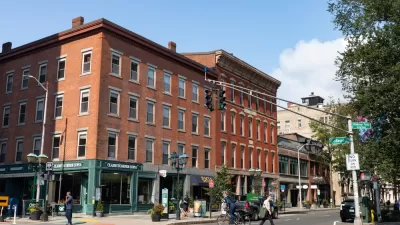The $1.7 trillion spending bill approved by Congress earlier in December includes a significant first: $85 million in discretionary grant funding for local governments to remove obstacles to housing development.

Congress passed a $1.7 trillion spending bill on December 20, sending the bill onto President Biden for a signature. The New York Times provides news coverage of the bill’s approval and CNN provides details of what’s included in the bill.
One program of particular interest to planners, the bill includes $85 million for a new U.S. Department of Housing and Urban Development (HUD) planning incentive program advocated by the National Multifamily Housing Council (NMHC) and National Apartment Association. According to an article by Paul Bergeron for Globe St, the “Yes In My Back Yard” program is designed “to help localities eliminate exclusionary policies, zoning and density restrictions, onerous parking requirements and other regulations.”
“The grant program will help fund efforts by local communities to update their zoning codes and community engagement to remove obstacles to affordable housing production and preservation,” adds Bergeron.
A statement by the NMHC describes the new grant program as the first federal YIMBY policy that will be enacted into law. U.S. Senator Todd Young (R-Indiana) first introduced the Yes In My Backyard Act into Congress in 2019.
According to another article by Christian Britschgi for Reason, the YIMBY Act gained support from the Biden campaign in 2020, but also again after the Biden administration entered office. “In its Housing Supply Action Plan from May 2022, the White House also said it would retool discretionary transportation grant programs (worth a collective $6 billion) to incentivize liberalizing zoning reforms,” according to Britschgi.
Britschgi does caution that the $85 million in funding for the new program is unlikely to produce much progress on zoning reform.
“For starters, the bill would provide money to jurisdictions for identifying and removing barriers to affordable housing production. Once given, the money could be spent on improving "housing strategies," implementing "housing policy plans," and facilitating affordable housing production,” writes Britschgi.
“Taken together, that sounds like the program would pay jurisdictions just for drawing up plans for improving housing production, an approach that some housing economists have argued is ineffective.”
FULL STORY: A First: NIMBY-Opposition Funds Included in Congress' Annual Funding Bill

Alabama: Trump Terminates Settlements for Black Communities Harmed By Raw Sewage
Trump deemed the landmark civil rights agreement “illegal DEI and environmental justice policy.”

Planetizen Federal Action Tracker
A weekly monitor of how Trump’s orders and actions are impacting planners and planning in America.

The 120 Year Old Tiny Home Villages That Sheltered San Francisco’s Earthquake Refugees
More than a century ago, San Francisco mobilized to house thousands of residents displaced by the 1906 earthquake. Could their strategy offer a model for the present?

Ken Jennings Launches Transit Web Series
The Jeopardy champ wants you to ride public transit.

BLM To Rescind Public Lands Rule
The change will downgrade conservation, once again putting federal land at risk for mining and other extractive uses.

Indy Neighborhood Group Builds Temporary Multi-Use Path
Community members, aided in part by funding from the city, repurposed a vehicle lane to create a protected bike and pedestrian path for the summer season.
Urban Design for Planners 1: Software Tools
This six-course series explores essential urban design concepts using open source software and equips planners with the tools they need to participate fully in the urban design process.
Planning for Universal Design
Learn the tools for implementing Universal Design in planning regulations.
Clanton & Associates, Inc.
Jessamine County Fiscal Court
Institute for Housing and Urban Development Studies (IHS)
City of Grandview
Harvard GSD Executive Education
Toledo-Lucas County Plan Commissions
Salt Lake City
NYU Wagner Graduate School of Public Service




























